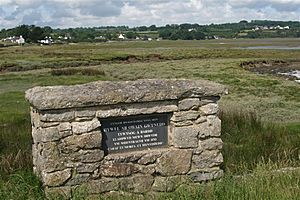Hywel ab Owain Gwynedd facts for kids
Quick facts for kids Hywel ab Owain Gwynedd |
|
|---|---|
| King of Gwynedd | |
| Reign | 1170 |
| Predecessor | Owain Gwynedd |
| Successor | Dafydd ab Owain Gwynedd |
| Born | c. 1120 |
| Died | 1170 Pentraeth, Ynys Mon, Wales |
| Issue | Gruffudd ap Hywel ab Owain Gwynedd Caswallon ap Hywel |
| House | Aberffraw |
| Father | Owain Gwynedd |
| Mother | Ffynod Wyddeles |
Hywel ab Owain Gwynedd (around 1120–1170) was a Welsh prince, poet, and military leader. He became the Prince of Gwynedd in 1170. Hywel was the son of Owain Gwynedd, who was a powerful prince of Gwynedd, and an Irish woman named Pyfog. Because of his mother, he was also known as Hywel ap Gwyddeles, which means "Hywel, son of the Irishwoman." People also called him the "Poet Prince" because he was very skilled at writing poems.
Biography
Military Adventures
Hywel's father, Owain, and his uncle, Cadwaladr, had a big disagreement in 1143. This happened because Cadwaladr was involved in the killing of Prince Anarawd ap Gruffydd. Anarawd was an important ally of Owain and was supposed to marry Owain's daughter. Owain wanted to make alliances with other Welsh rulers by arranging marriages, and Cadwaladr's actions threatened these plans.
To punish Cadwaladr, Owain took away his lands and gave them to Hywel in 1139. Hywel then went to Ceredigion and burned Cadwaladr's castle at Aberystwyth, forcing his uncle out in 1143. Cadwaladr fled to Ireland and returned with a fleet of ships from Dublin, hoping to make Owain give him back his lands. Owain eventually made peace with Cadwaladr, and he got his lands back in 1144.
Hywel later joined forces with Cadell ap Gruffydd from Deheubarth to fight against the Normans in west Wales. They successfully captured Carmarthen, Llanstephan, and Wiston castles.
In 1147, Hywel and his brother Cynan drove Cadwaladr out of Meirionydd and Ceredigion. Hywel also captured Cadwaladr's son, Cadfan, in 1150. Another agreement was reached, but in 1153, Cadwaladr was forced to leave Wales and go to England.
Hywel also fought alongside his father, Owain Gwynedd, against Henry II of England in 1157. Later, in 1159, Hywel joined a Norman army from Carmarthen castle against Lord Rhys of Deheubarth. After this, Hywel rebelled against Henry II. These actions likely showed Owain Gwynedd's clever plans and his desire to stay on good terms with the English king.
Becoming Prince
In 1146, a sad event happened: Owain Gwynedd's favorite eldest son and chosen heir, Rhun, died. Owain was very sad. However, when he heard that Mold castle had been captured by Gwynedd, it reminded him that he still had a country to live for.
As the oldest surviving son, Hywel was expected to take over from his father when Owain died in 1170. This was according to Welsh law and custom. However, Hywel immediately faced a challenge from his stepmother, Cristin. She wanted her own son, Dafydd, to become Prince of Gwynedd instead of Hywel. She also wanted Gwynedd to be divided between Dafydd and her other son, Rhodri. It seems this plan was made even before Owain died.
Within a few months of becoming prince, Hywel had to escape to Ireland. He returned later that year with an army from Ireland and landed on the island of Môn (Anglesey). Dafydd also brought his army to the island and surprised Hywel at Pentraeth. Dafydd's army defeated Hywel's forces, and Hywel was killed in the battle.
After Hywel's death, Owain's remaining sons made peace with Dafydd. The land of Gwynedd was divided among them for a short time. However, by 1174, Dafydd had taken control of all of Gwynedd, imprisoning some of his brothers.
His Poetry
During the battle where Hywel died, the seven sons of his foster-father, Cadifor, were killed defending him. Their bravery was remembered in a poem:
- The sons of Cadifor, a noble band of brothers
- In the hollow above Pentraeth
- Were full of daring and of high purpose
- They were cut down beside their foster-brother.
Hywel was a very talented poet. Eight of his poems have survived and can be found in a collection called The Myvyrian Archaiology of Wales. His most famous poem is probably Gorhoffedd Hywel ab Owain Gwynedd. In this poem, he praises his father's kingdom of Gwynedd, describing its beautiful nature and its lovely women. Some of his other poems are the earliest known love poems written in the Welsh language, and they might show some influence from French poetry.
Family
Hywel is known to have had the following sons:
- Gruffudd ap Hywel ab Owain Gwynedd
- Caswallawn ap Hywel ab Owain Gwynedd
In Fiction
Hywel appears as a character in the historical mystery novel The Summer of the Danes. This book is part of the Cadfael Chronicles series by Ellis Peters. Hywel ab Owain is also written about in Sharon Kay Penman's novels When Christ and His Saints Slept and Time and Chance.
See also
- Hywel ab Owain Gwynedd at Welsh language Wikisource
| Regnal titles | ||
|---|---|---|
| Preceded by Owain Gwynedd |
Prince of Gwynedd 1170–1170 |
Succeeded by Dafydd ab Owain Gwynedd by usurpation |
 | Isaac Myers |
 | D. Hamilton Jackson |
 | A. Philip Randolph |


